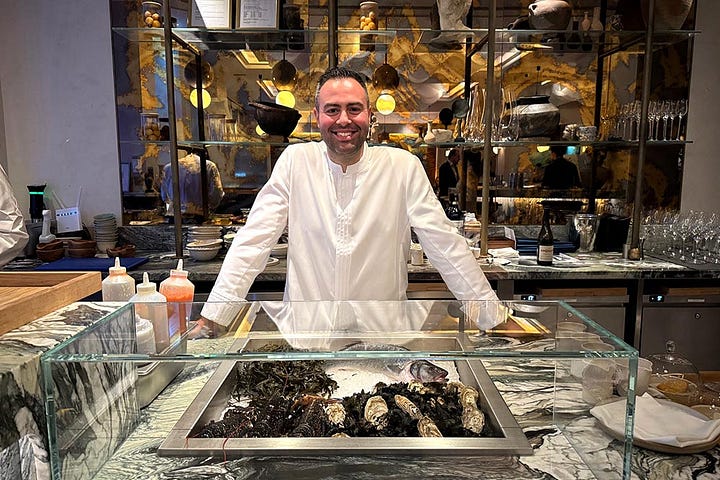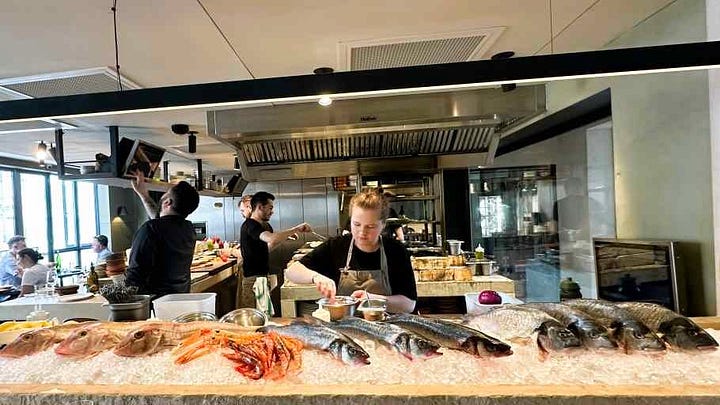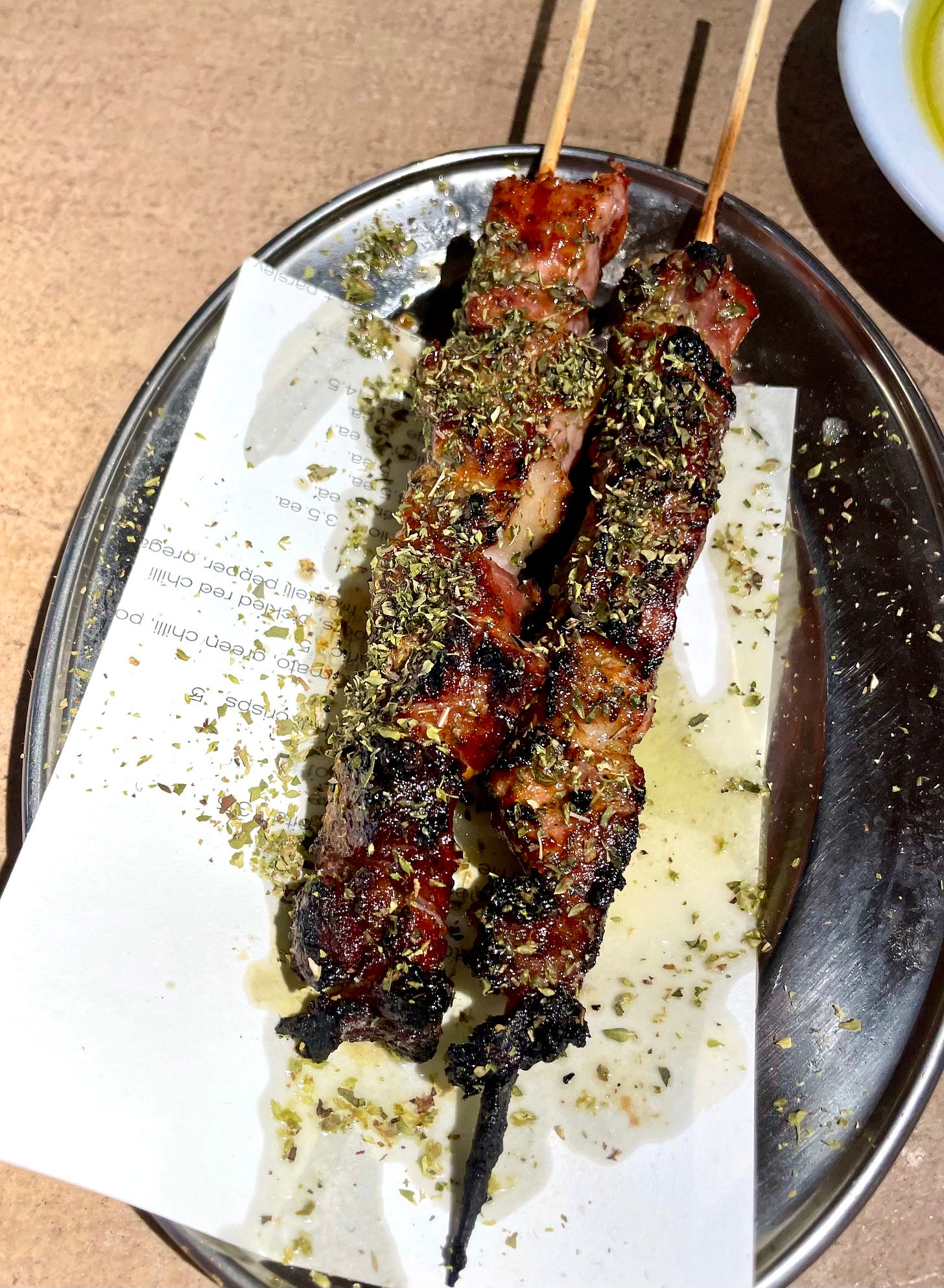London's Greek dream on a plate
The UK's first Greek restaurant to win a Michelin star, Oma, is leading a clutch of new Greek eateries in the capital. Plus: what I've been drinking this week – in Manchester




As I bit into the porky, oregano-flecked deliciousness of a souvlaki at Agora this week, I recalled the simplicity of a similar dish at a Cretan taverna. That evening in the village of Loutro, accessible only by boat, I asked the elderly grill chef, a white-bearded man surrounded by charcoal smoke, how he made his lamb chops. He shrugged and replied, in Greek, gesturing to the bay before us, “salt from the sea,” (his hand now indicated the steep hill behind us) “oregano from the mountain”. That – other than lamb raised by his family on these hills – was it. Yet it was utterly unimprovable.
This is both the glory and the dilemma of Greek cuisine, especially somewhere like London. Greek food’s brilliance is in its freshness and simplicity, with dishes served as they are ready, ideally outdoors in the sun or on a warm evening. And unashamed new-wave Greek wine fan though I am, under such conditions, even the most modest house white served in a metal jug is a fine accompaniment. But how does a restaurant recreate that far away from the patrída, in a cold climate and with local ingredients? And how does an ambitious chef take that food up a notch or five?
I’ve been thinking about this while visiting several newish Greek eateries in London over the past few months. Greek food in London received a boost in February this year, when David Carter’s much-praised Oma won a Michelin star – the first ever Greek restaurant in Britain so honoured. Oma, with the more casual souvlakia-and-flatbreads-based joint Agora downstairs, opened in Borough Market in April 2024. But so far this year there have been two more additions to the city’s high-end Greek dining offer: Athenian chef Angelos Togias’s Krokodilos, on Kensington Church St and, since May, Myrtos, a project of ex-Pied à Terre, Michelin-starred chef Asimakis Chaniotis in South Kensington.
I thought of the Loutro lamb chops at Myrtos, where I ordered the same dish, the most rustic of the sharing dishes on the menu. Chaniotis does also offer a salt-baked Kefalonian sea bass – he’s Kefalonian and is Executive Chef of up-market Terre Mouikis in Argostoli on that island. But you’re not going to find the other shared dishes – côte de boeuf, pork tomahawk steak, whole lobster giouvetsi stew – on many menus in Greece. More important, aside from the fact that the Myrtos chops cost £50 and arrived very late, they really weren’t a patch on the Loutro ones.
Elsewhere the menu was better, however. I enjoyed Chaniotis’s playful approach to deconstructing Greek classics. His deconstructed hortopita (a pie of wild greens) and Greek salad (arranged around a feta mousse) were both memorable. His taramosalata incorporates trout as well as cod roe and is further enlivened by dill oil: simply stunning.
But despite the olive trees, it’s frankly always going to be difficult to make any corner of Brompton Road feel very Greek: the public-school-and-eurotrash vibe will always win out. It’s so strange how men wearing shoes without socks can signify such polar class opposites within the same city, here versus, say, Sutton: “what house were you in?” as opposed to, “what’s your game, mate?”
Myrtos’s list of around 50 Greek wines is good: a little weak on reds though far ahead of anything in London 15 years ago. It’s a measure of the meteoric rise of Greek wine over the past 20 years that no decent Greek restaurant in London (or New York) would today dream of having a list that wasn’t majority Greek. Like Myrtos as a whole, the wine’s not cheap: a bottle of Domaine Karanika’s Cuvée Spéciale 2022, probably Greece’s best sparkling wine, is £72, against £48 at my Greek local, Evi’s – but this being South Ken, I suppose that’s inevitable (for comparison, it’s £62 at Oma.) Meanwhile with my meal I enjoyed a white Cretan favourite, Lyrarakis’s “Psarades” Dafni 2023 (£54) – a brilliant food wine.
Up the road at Krokodilos, Angelos Togias (ex-Connaught) takes a not-dissimilar approach to his nation’s cuisine. His deconstructed spanakopita is essentially pie filling served separate from bread; his Greek salad isn’t as radical a reinterpretation as Chaniotis’s, though the Santorini capers were a lovely touch. Elsewhere, though, this feels a more traditional menu, albeit served in high style: thus rabbit stifado, and superlative calamari with intense tomatoes and oregano. There are more unusual but authentic dishes here too: wild goat with Cretan pasta, and a showing for humble mavromatika (black eyed beans/peas), a dish rarely seen on Greek menus outside the country, indeed outside the nation’s villages. All in all, this is some of the best Greek food I’ve had anywhere.
Krokodilos boasts around 65 Greek wines and a stronger red selection than Myrtos, including important Xinomavros such as Kir-Yianni’s Diaporos 2019 and Magoutes’s parcel-selection Xinomavro 2017. But again, this is a pricey list, especially by the glass.
The other route that ambitious Greek restaurants can take is fusion – the choice of Oma, London’s hottest Greek destination right now. I last went with my friend, wine critic and fellow Hellenophile Olly Smith, back in March: even on a Tuesday lunchtime, the place had the buzz of a restaurant on a roll, running in high gear.
The fusion starts with the range of breads, including açma verde, a soft, flaky, bagel-shaped Turkish roll, and laffa flatbread, a fluffy Israeli take on pita – served not only with (amazing) tarama and baba ganoush but also with Serbian ajvar, a puree of roasted red peppers, here served with Greek mizithra cheese and hazelnuts. Elsewhere, classic Greek dishes are given unexpected twists, such as the giouvetsi with oxtail, bone marrow and beef-fat pangrattato, or the charred lamb belly with hummus and mint. There are similar touches downstairs at Agora, such as the superb butterflied mackerel with za’atar, and chard borani (Iranian yoghurt salad) with crispy garlic. Then again, the tuna ceviche and the trout sashimi aren’t even vaguely Greek – yet somehow they fit into the menu brilliantly.
This eclectic approach isn’t so surprising considering that the kitchen is led by Jorge Paredes, formerly executive chef at Nieves Barragán’s Michelin-starred London tapas restaurant, Sabor. And it extends to Oma’s stunning wine list too. Not only is this probably the most extensive Greek list in London, with around 90 bottles, but it follows the restaurant’s fusion ethic with a wide range of wines from elsewhere in the Mediterranean too – Sicily, the Balearic islands, the Canaries, Corsica and Provence. Not that the Greek selection doesn’t impress: I don’t know that I’ve seen a more thoughtfully sourced range of Xinomavros anywhere. Like Oma’s menu, its wine list is one you already long to return to by the end of your meal.
Then again, if you’re prepared to keep your Greek food simple and chug along in a neighbourhood setting, East Dulwich’s Evi’s is about as good as it gets. Evi’s has in fact been open a couple of years now, a permanent home for street-food stall Souvlaki Street, a favourite of Pop Brixton and elsewhere for almost a decade before the restaurant’s arrival. It’s a cheerfully low-key space off Lordship Lane, with shorter menu and a very different feel to its up-market West-London rivals. The classics here, such as pork kalamakia (as souvlakia are known in Athens), lamb chops and kolokithokeftedes (courgette fritters) are unbeatable. Their fish is good too, though they have a tendency to run out of specials quickly.
There are around a dozen wines and couple of good Greek craft beers (from Nissos and Septem), all well priced. The last time I was here I drank Nikos Karavitakis’s “Klima” 2023 Vidiano, from Crete (I’d visited the winery two weeks earlier) and Apostolos Thymiopoulos’s classic “Jeunes Vignes” Xinomavro. It was nice to see a Greek orange wine on the list too, Tetramythos’s “Natur” 2022, from the obscure Peloponnese grape Sideritis. And they offer that extraordinary Lyrarakis Dafni too.
Greece’s cuisine – and its wines, to a lesser degree – offer the magic trick of conjuring up Aegean sunshine for northern Europeans. Yet while they hold out that promise, they can rarely deliver the full experience. How could they, in the heart of London? Greek food is Christian eastern-mediterranean peasant food, a cuisine untouched until relatively recently by bourgeois expectations. That both urban Greeks and norther Europeans have become more demanding is no bad thing: the quality of food in Greece has improved over the past 20 years, having previously been homogenised by years of mass tourism. I love that Krokodilos can now offer an up-market oxtail take on pastitsio (the rough cultural equivalent of a high-end shepherd’s pie.) But for spanking-fresh anchovies and souvlakia by the sea, I’ll just have to go back to Crete.
What I’ve been drinking this week – in Manchester
A visit to my son in Manchester last weekend was, naturally, an opportunity to explore the wine bars of Didsbury, his neck of the woods. Established wine shop and bar Reserve Wines, in West Didsbury, offers an interesting selection both by the bottle and glass – the Spanish and Italian ranges particularly caught my eye – as well as cheese and charcuterie plates. Meanwhile Cru, recently launched in Didsbury by ex-Reserve staff, boasts a more ambitious range of small plates – Yuzu-cured sea bass with Aperol Spritz reduction, pickled jalapeño, sweet pickled pink onion, coriander oil, and hazelnut? – as well as an impressively eclectic range of wines.


Tenuta il Bosco Oltrenero Brut Nature NV – Cru are sparkling wine specialists and offer a range of unusual bottles and by-the-glass sparklers: indeed since my visit, looking on WineSearcher, I’m not sure where they managed to source some of them from – certainly only in small quantities. This an unusual Italian sparkler from Pavia, south of Milan, made entirely from Pinot Noir. Crisp and elegant with bready notes – very enjoyable (Xtra Wine, Cru, from £29.)
New Theory Love Bite 2023, Stellenbosch – a South African Cinsault in an unfamiliar, Beaujolais-like style: fresh, sweet red fruit and soft tannins, delicious served chilled (Ocado, Amathus Drinks, Cru and elsewhere, from £14.)
Andreas Syrah 2021 – the label doesn’t say so but this South African red is from near Wellington, to the north of Stellenbosch. A beautiful blend of old and new world styles – I’d have been hard put to guess where this was from: sweet, expressive fruit, firm tannins and a touch of oak, without being in any way overpowered. Lovely (Reserve Wines, Cellar Door, Highbury Vintners, from £19.50.)
Kanakaris Agiorgitiko 2023, PGI Peloponnese – I often find Agiorgitiko disappointing: the biggest red grape of the Peloponnese has traditionally been made in a dry style with a lot of extraction and harsh tannins. No so this one, which keeps the grapes richness and coffee-chocolate note while delivering soft tannins and beautiful balance (Reserve Wines, Vinatis, from £13.45.)
Look out for my new book with Jane Masters MW, Rooted in Change: The Stories Behind Sustainable Wine - out 1 October from the Academie du Vin Library.





With the South London terrain looking as scorched as Crete maybe Greek food and wine is the best way to cope with the heatwaves!
Holiday in Kalves last summer, east of Chania in Crete.5 great tavernas in walking distance at very reasonable prices and good wines.A great wine whole seller in the village.
The real deal.Go to Crete every time.